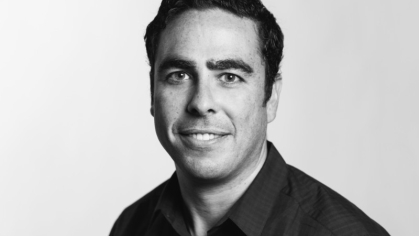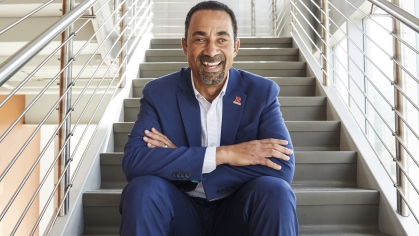There will always be a mechanical world, and there will always be people. Mechanical engineers design things for people to interact with and that’s never going away. – Stephen Recchia

Stephen Recchia is the 2025 recipient of the Distinguished Young Alumnus Award. He earned his School of Engineering bachelor’s degree in mechanical engineering in 2004 and later received his PhD in materials science and engineering in 2016. He has served the Department of Defense (DoD) for 21 years, by leading programs and designing munitions and ordinance. He is currently a program manager in the Office of the Undersecretary of Defense – Manufacturing and Technology (OSD-ManTech) team, where he oversees the DoD’s nine Manufacturing Innovation Institutes (MIIs) with a focus on advancing DoD manufacturing capabilities through academic, industry, and government collaborations. Before joining the OSD-ManTech office, he was a senior research engineer at the U.S. Army DEVCOM Armaments Center, where he applied his expertise to consult on Army projects experiencing reliability and performance issues.
What does the Distinguished Young Alumnus Award mean to you personally and professionally?
It’s quite the honor, and it was a surprise. To be recognized by the school I got my bachelor’s degree and doctorate from is really meaningful, not only to my pride in my personal accomplishments and within the network I’ve built for myself, but it will help me grow that network out moving forward.
Why did you choose Rutgers for your degree programs?
Originally, I chose Rutgers because being from New Jersey, I wanted to stay local, and it has a great reputation. The running joke at Rutgers is that the further away from New Jersey you get, the more prestigious your degree gets. True!
What drew you to mechanical engineering?
I liked working on cars and other mechanical systems, especially in high school. I was terrible at chemistry, so when the time came to declare my major, I was leaning towards mechanical engineering or materials science and engineering. I chose mechanical engineering, but I was later able to combine the two with my doctorate in materials science and engineering.
When did you first work with the army?
After graduating, I got a job with the army at the Picatinny Arsenal. They offered reimbursement for graduate courses, so I got my MS in mechanical engineering from Stevens Institute of Technology.
I preferred my Rutgers education to Stevens’, so I entered into a doctoral program and worked jointly with mechanical engineering and materials science for a Rutgers doctorate. The army reimbursed me for my labor but not for the cost of research. I was, however, able to find the U.S. Army Natick Soldier Systems Center in Massachusetts, which funded my work on body armor for the Army.
What do you most value about your Rutgers Engineering education?
My undergraduate education has been what I most value in my professional career. Rutgers really focused on proving you understood topics theoretically. This made it easier to learn and use new physics mathematics when predicting dynamics.
In my graduate work, I was able to broaden my understanding of materials and how they are engineered. This changed my approach to designing systems. The graduate program also helped me grow my professional network, which opened new opportunities in my career.
What are your current responsibilities as a Department of Defense Military Program Manager in the Office of the Undersecretary of Defense – Manufacturing and Technology?
I’m a project manager with the DOD Manufacturing Innovation Institutes (MII). I manage collaborative public-private partnerships in distinct industrial sectors that develop advanced manufacturing technologies able to deliver essential products and systems that modernize the military efficiently and economically.
I lead a team of 21 government program managers, who handle each non-profit partner organization. All told, I oversee consortia with more than 2,500 MII members from the defense industry, commercial manufacturers, universities, and state and local economic developers.
What are you most proud of?
I’ve always enjoyed system architecture and testing for programs. The ability to take what I’ve learned in school and help things get into the field is so rewarding. Nothing beats that.
What advice do you have for today’s engineering students?
Take advantage of all the opportunities the school provides you with. One of my biggest regrets is that I didn’t take advantage of all the network building.
Don’t get pigeon-holed to only design one thing. Your engineering education supports your ability to work on varying systems and products.
Would you encourage today’s students to major in mechanical engineering?
I would. There will always be a mechanical world, and there will always be people. Mechanical engineers design things for people to interact with and that’s never going away.
Do you have a favorite student memory?
As part of my undergraduate research, I was on the Battlebots team. It’s a robotic competition where robots try to destroy each other. I got to drive our robot at the competition in San Francisco.
That was a lot of fun. It’s really fun to break things and I got to work on things that destroy each other. Meeting hundreds of like-minded competitors at a major event was an added bonus.
What did you do for fun as a student?
I hung out – I’m not that interesting of a person, really. I did meet my wife at Rutgers – who was in the pharmacy school. Rutgers has done my family extremely well. We’re forcing Rutgers on our kids. They’re willful, so we’ll see what happens.
What was your most recent vacation?
We were in Maui when the tsunami hit on our third day. Our hotel was evacuated up-country, and so we sat in a grocery store parking lot until the warnings went away. It was treated like a tornado warning. The ocean swells were higher, and our snorkeling trip was cancelled. But we still got to be on a beautiful beach!
The views expressed are those of the interviewee and do not reflect the official policy or position of the US Army, Department of Defense, or the US Government.


